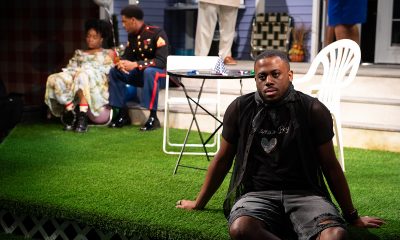Arts & Entertainment
Hazards of performing ‘Hamlet’ outdoors
Maryland Renaissance Festival offers range of entertainment
By CAROLYN SPEDDEN
Tackling what is arguably Shakespeare’s greatest tragedy would be a daunting task for any director and ensemble of actors. But performing “Hamlet” in an outdoor environment where a hurricane pelts rain on you during your first performance and horrific humidity follows for the next show, might send even the most devoted thespian scurrying back to the comfort of a castle in Denmark.
“Outdoor performance is really about survival as much as it is about being heard. After opening with a hurricane this year, that couldn’t be more apparent,” notes Graham Pilato, a Washington actor playing Horatio in the Festival’s production of “Hamlet.”
While the Renaissance Festival presents edited versions of classic plays each year, this 100-minute edition of Hamlet is the most ambitious so far — not least because the play is so famous.
Jack Powers, who plays Hamlet in the production, had to deal with that from the start. “You try to ignore the renown of the speeches and only try to pick up on the big thoughts in them, not the larger-than-life status of the speeches themselves.”
Director John Sadowsky also had the daunting task of editing Shakespeare’s longest play into two 50-minute acts. “I approached the job as telling the story in as simple, direct and entertaining a way as possible. First and foremost, I wanted to tell the basic story of Hamlet’s conflicts and revenge.”
And how does one approach one of the most iconic roles in theater? For Sadowsky, his view of the role changed at auditions. “I was going to go with the traditional 30-something, who just prefers to stay in and around his college until called back to Elsinore to assume the throne. But I saw something really special in Jack’s audition and decided to go with the 20-year-old Hamlet, a real college student who is genuinely pissed off at not succeeding his father and who could be goaded into action by the ghost of his father, real or imagined. He isn’t any more indecisive than any other 20-something and we can clearly see his vengeance plot take hold. I think our Hamlet is someone that young people in the audience can identify with, even those without uncles who killed their fathers and married their mothers. He has more fun in him and I hope people will see him sympathetically.”
The play is presented in two acts, beginning at 1 p.m. each day at the festival’s Globe Theatre. In addition of their roles in Hamlet, Pilato and Powers also do improvisational work in the pathways, directly connecting with the audience.
“For street work, it’s about gauging the audience to know what sort of bit to perform with them, to really make some quick judgments about what they might prefer to have me say or do, says Pilato. “I’m a huge fan of what we do. Being able to help provide that depth and wonder to audiences makes me really happy. It’s also lovely to have an opportunity to work and play with some really awesome talents — I’ve learned a lot about clowning, classical theater, voice and movement and improvisation in the company of these great folks.”
Director Sadowsky, who also performs at the Festival, agrees. “Audience interaction, the improvisation and sustaining a character for very long periods of time have tremendously helped my acting in more traditional theaters the rest of the year. I can easily handle anything that could go awry in live theater because of my experience in the Renaissance Festival.”
Absolutely. Because after performing in a hurricane, a drafty theater is a piece of cake.
The Maryland Renaissance Festival runs weekends until Oct. 23. For more information visit marylandrenaissancefestival.com.

Team DC, the umbrella organization for LGBTQ-friendly sports teams and leagues in the D.C. area, held its annual Night of Champions Awards Gala on Saturday, April 20 at the Hilton National Mall. The organization gave out scholarships to area LGBTQ student athletes as well as awards to the Different Drummers, Kelly Laczko of Duplex Diner, Stacy Smith of the Edmund Burke School, Bryan Frank of Triout, JC Adams of DCG Basketball and the DC Gay Flag Football League.
(Washington Blade photos by Michael Key)




















The 2024 National Cannabis Festival was held at the Fields at RFK Stadium on April 19-20.
(Washington Blade photos by Michael Key)
















Covering the @NatlCannaFest at RFK Stadium for @WashBlade . Stop by the LGBTQ+ booth and pick up a paper if you are here. pic.twitter.com/is7hnsaPns
— Michael Patrick Key (@MichaelKeyWB) April 20, 2024
Theater
‘Amm(i)gone’ explores family, queerness, and faith
A ‘fully autobiographical’ work from out artist Adil Mansoor

‘Amm(i)gone’
Thorough May 12
Woolly Mammoth Theatre
641 D St., N.W.
$60-$70
Woollymammoth.net
“Fully and utterly autobiographical.” That’s how Adil Mansoor describes “Amm(i)gone,” his one-man work currently playing at Woolly Mammoth Theatre.
Both created and performed by out artist Mansoor, it’s his story about inviting his Pakistani mother to translate Sophocles’s Greek tragedy “Antigone” into Urdu. Throughout the journey, there’s an exploration of family, queerness, and faith,as well as references to teachings from the Quran, and audio conversations with his Muslim mother.
Mansoor, 38, grew up in the suburbs of Chicago and is now based in Pittsburgh where he’s a busy theater maker. He’s also the founding member of Pittsburgh’s Hatch Arts Collective and the former artistic director of Dreams of Hope, an LGBTQ youth arts organization.
WASHINGTON BLADE: What spurred you to create “Amm(i)gone”?
ADIL MANSOOR: I was reading a translation of “Antigone” a few years back and found myself emotionally overwhelmed. A Theban princess buries her brother knowing it will cost her, her own life. It’s about a person for whom all aspirations are in the afterlife. And what does that do to the living when all of your hopes and dreams have to be reserved for the afterlife?
I found grant funding to pay my mom to do the translation. I wanted to engage in learning. I wanted to share theater but especially this ancient tragedy. My mother appreciated the characters were struggling between loving one another and their beliefs.
BLADE: Are you more director than actor?
MANSOOR: I’m primarily a director with an MFA in directing from Carnegie Mellon. I wrote, directed, and performed in this show, and had been working on it for four years. I’ve done different versions including Zoom. Woolly’s is a new production with the same team who’ve been involved since the beginning.
I love solo performance. I’ve produced and now teach solo performance and believe in its power. And I definitely lean toward “performance” and I haven’t “acted” since I was in college. I feel good on stage. I was a tour guide and do a lot of public speaking. I enjoy the attention.
BLADE: Describe your mom.
MANSOOR: My mom is a wonderfully devout Muslim, single mother, social worker who discovered my queerness on Google. And she prays for me.
She and I are similar, the way we look at things, the way we laugh. But different too. And those are among the questions I ask in this show. Our relationship is both beautiful and complicated.
BLADE: So, you weren’t exactly hiding your sexuality?
MANSOOR: In my mid-20s, I took time to talk with friends about our being queer with relation to our careers. My sexuality is essential to the work. As the artistic director at Dreams of Hope, part of the work was to model what it means to be public. If I’m in a room with queer and trans teenagers, part of what I’m doing is modeling queer adulthood. The way they see me in the world is part of what I’m putting out there. And I want that to be expansive and full.
So much of my work involves fundraising and being a face in schools. Being out is about making safe space for queer young folks.
BLADE: Have you encountered much Islamophobia?
MANSOOR: When 9/11 happened, I was a sophomore in high school, so yes. I faced a lot then and now. I’ve been egged on the street in the last four months. I see it in the classroom. It shows up in all sorts of ways.
BLADE: What prompted you to lead your creative life in Pittsburgh?
MANSOOR: I’ve been here for 14 years. I breathe with ease in Pittsburgh. The hills and the valleys and the rust of the city do something to me. It’s beautiful, it’ affordable, and there is support for local artists. There’s a lot of opportunity.
Still, the plan was to move to New York in September of 2020 but that was cancelled. Then the pandemic showed me that I could live in Pittsburgh and still have a nationally viable career.
BLADE: What are you trying to achieve with “Amm(i)gone”?
MANSOOR: What I’m sharing in the show is so very specific but I hear people from other backgrounds say I totally see my mom in that. My partner is Catholic and we share so much in relation to this.
I hope the work is embracing the fullness of queerness and how means so many things. And I hope the show makes audiences want to call their parents or squeeze their partners.
-

 District of Columbia5 days ago
District of Columbia5 days agoNew D.C. LGBTQ+ bar Crush set to open April 19
-

 South America3 days ago
South America3 days agoDaniel Zamudio murderer’s parole request denied
-

 Opinions5 days ago
Opinions5 days agoOpen or closed? No, not your bar tab
-

 Maryland4 days ago
Maryland4 days agoMontgomery County police chief discusses arrest of trans student charged with planned school shooting












